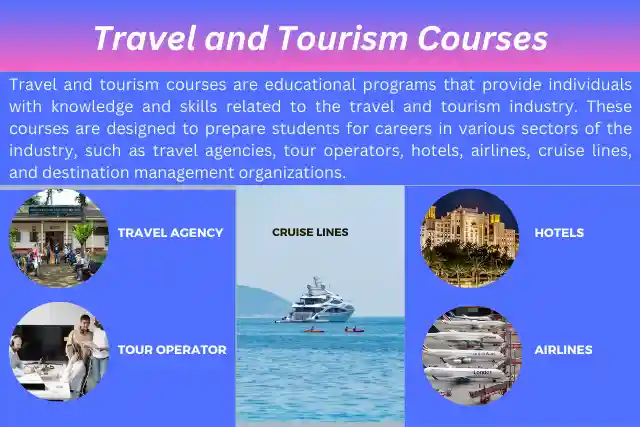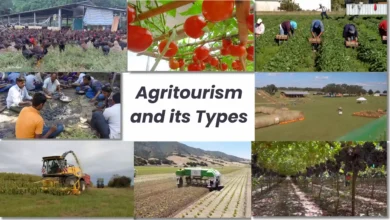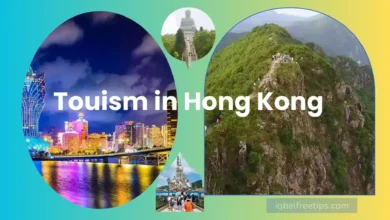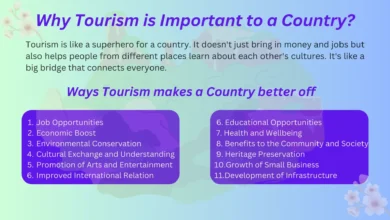
Travel and Tourism Courses
Travel and tourism courses provide knowledge and skills for success in the industry. They prepare students for careers in travel agencies, hotels, airlines, and more. These courses cover topics like management, customer service, marketing, and sustainability. By taking a travel and tourism course, individuals gain industry knowledge, valuable skills, practical experience, and career opportunities while exploring diverse cultures and destinations.
In this article, we delve into the world of travel and tourism courses, exploring the knowledge and skills they provide to individuals aspiring to excel in the industry.
What are Travel and Tourism Courses?
Travel and tourism courses are educational programs that provide individuals with knowledge and skills related to the travel and tourism industry. These courses are designed to prepare students for careers in various sectors of the industry, such as travel agencies, tour operators, hotels, airlines, cruise lines, and destination management organizations.
Travel and tourism courses can be offered at various levels, including diplomas, undergraduate degrees, and postgraduate degrees. They are available at universities, colleges, vocational schools, and online learning platforms. These courses provide students with a solid foundation of knowledge and practical skills necessary for a successful career in the travel and tourism industry.
Travel and tourism courses cover a wide range of topics that are relevant to the industry
- Travel and tourism management
- Hospitality and customer service
- Destination Marketing
- Tour operation
- Travel agency operation
- Event management
- Sustainable tourism
Travel and Tourism Management
This includes an overview of the travel and tourism industry, its structure, and its role in the global economy. Students learn about the management principles and techniques specific to the industry.
Hospitality and Customer Service
These courses focus on providing excellent customer service in the context of the travel and tourism industry. Topics may include front office operations, food and beverage management, and hospitality marketing.
Destination Marketing
Students learn about promoting and marketing tourist destinations. They study strategies for attracting tourists, developing tourism products, and managing destination branding.
Tour Operations
This area of study focuses on planning, organizing, and executing tours. Students learn about itinerary planning, transportation logistics, accommodation arrangements, and tour guiding.
Travel Agency Operations
Courses in this field cover the operations and management of travel agencies. Students learn about ticketing and reservation systems, travel documentation, travel insurance, and regulatory compliance.
Event Management
This specialization focuses on planning and managing events in the travel and tourism industry. Students learn about event logistics, marketing, risk management, and budgeting.
Sustainable Tourism
This course explores the concept of sustainable tourism and its environmental, social, and economic impacts. Students learn about responsible tourism practices and strategies for minimizing negative impacts.
Some of the Benefits of Taking a Travel and Tourism Course
Taking a travel and tourism course can provide individuals with numerous benefits. Here are some advantages of pursuing a travel and tourism course.
- Industry knowledge
- Skill development
- Professional network
- Practical experience
- Industry recognition
- Global Perspective
- Personal Enrichment
- Career opportunities
Industry Knowledge
Travel and tourism courses offer comprehensive knowledge about the industry, including its history, trends, and current practices. Students gain insights into various sectors of the industry, understanding how they operate and interact. This knowledge helps individuals develop a strong foundation and understanding of the industry’s dynamics.
Skill Development
Travel and tourism courses focus on developing a wide range of skills relevant to the industry. These may include communication skills, customer service skills, marketing and sales techniques, event planning, destination management, and problem-solving abilities. These skills are highly transferable and can be applied to various roles within the industry.
Professional Network
During a travel and tourism course, students have the opportunity to build a network of industry professionals, fellow students, and alumni. Networking events, guest lectures, and industry placements provide valuable connections that can lead to internships, job opportunities, and mentorship.
Practical Experience
Many travel and tourism courses offer practical components such as internships, field trips, and hands-on projects. These experiences provide students with real-world exposure to the industry, allowing them to apply their knowledge and skills in practical settings. Practical experience enhances their understanding of the industry and increases employ-ability.
Industry Recognition
Completing a travel and tourism course from a reputable institution adds credibility to one’s resume. Employers in the industry recognize and value qualifications from recognized programs, increasing the chances of securing employment. The course provides a formal qualification that demonstrates a commitment to professional development.
Global Perspective
Travel and tourism courses often cover topics related to international tourism, cultural diversity, and global trends. Studying these subjects fosters a global perspective, enabling individuals to understand different cultures, tourism practices, and international markets. This global mindset is valuable in an industry that operates on a global scale.
Career Opportunities
The travel and tourism industry offers diverse career opportunities in areas such as travel agencies, tour operations, hotels, airlines, cruise lines, event management, and destination marketing. By gaining specialized knowledge and skills through a travel and tourism course, individuals can pursue a variety of rewarding careers in this dynamic industry.
Personal Enrichment
Studying travel and tourism can be personally enriching, as it exposes individuals to different cultures, destinations, and experiences. It can foster a love for travel and a deep appreciation for the role of tourism in connecting people and promoting cultural exchange.
Conclusion
In conclusion, travel and tourism courses offer individuals a pathway to success in the industry by equipping them with the necessary knowledge and skills. These courses prepare students for a range of career opportunities in travel agencies, hotels, airlines, and other sectors. With a focus on industry-specific topics and practical experience, individuals can develop valuable skills and gain industry recognition. Moreover, the global perspective and personal enrichment gained through studying travel and tourism enhance both professional and personal growth.
You may like:




